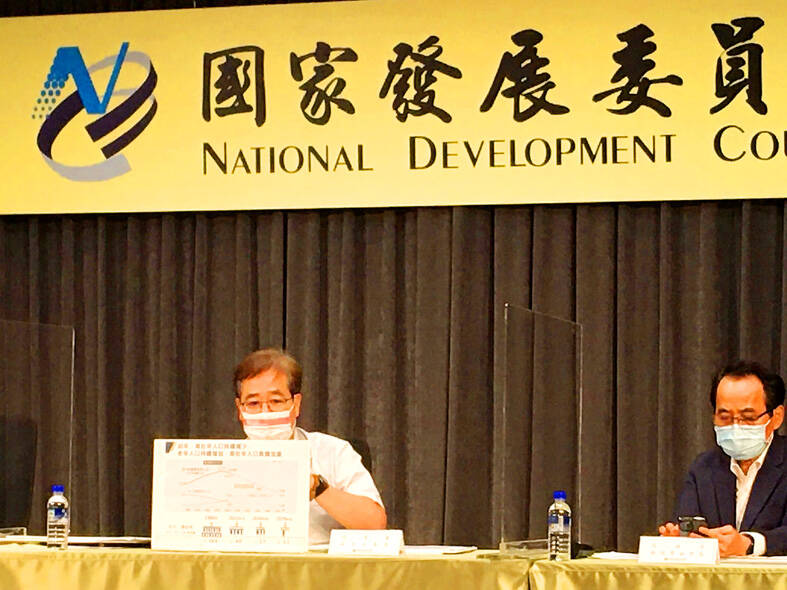Taiwan is still set to become a super-aged society by 2025, but with a larger dependent population than forecast in a previous study in 2020, meriting the attention of policymakers, the National Development Council said yesterday.
The council made the call after releasing its biannual projection on the nation’s demographic trends for the coming 50 years, based on latest household registration, birth, death, migration and other data.
“Taiwan is on schedule to become a super-aged society in three years, when the ratio of people aged 65 years or older will exceed 20 percent” of total population, the council said.

Photo: Wu Hsin-tien, Taipei Times
While the pace of aging remains the same and the demographic dividend is expected to end in 2028 as previously projected, the dependent population has been growing faster than expected, the council said.
The dependent population — including children and people aged 65 or older — would be equal to 42.2 percent of the workforce this year and climb to 53.2 percent in 2030, and outnumber the working population by 2060, four years earlier than previously forecast, the council said.
The number of people aged 15 to 64, or the working-age population, is projected to reach 16.3 million this year, before falling to 15.07 million by 2030 and to 7.76 million by 2070, the council said.
The number of elderly people is increasing, while the workforce is shrinking, the council said.
If unaddressed, the trend would be unfavorable and unhealthy for economic and social development, it said.
The demographic dividend ends when the number of people aged 15 to 64 account for less than 75 percent of the overall workforce, signifying a sluggish labor force and an increasing social burden, it said.
The government can tackle demographic challenges by boosting the birthrate to slow the pace of aging, and by encouraging senior citizens and women to join the labor force, the council said.
Low wages in Taiwan make young people unwilling and hesitant to marry and raise children, pundits have said.
In the meantime, the government should motivate the private sector to transform and upgrade operations, for example by embracing automation to cut its dependence on human labor, the council said.
Policymakers should relax immigration requirements so that foreigners can move to Taiwan for work more easily, it said.
The government should adopt measures to make Taiwan a safe and friendly living environment for elderly people, the council said.

INVESTIGATION: The case is the latest instance of a DPP figure being implicated in an espionage network accused of allegedly leaking information to Chinese intelligence Democratic Progressive Party (DPP) member Ho Jen-chieh (何仁傑) was detained and held incommunicado yesterday on suspicion of spying for China during his tenure as assistant to then-minister of foreign affairs Joseph Wu (吳釗燮). The Taipei District Prosecutors’ Office said Ho was implicated during its investigation into alleged spying activities by former Presidential Office consultant Wu Shang-yu (吳尚雨). Prosecutors said there is reason to believe Ho breached the National Security Act (國家安全法) by leaking classified Ministry of Foreign Affairs information to Chinese intelligence. Following interrogation, prosecutors petitioned the Taipei District Court to detain Ho, citing concerns over potential collusion or tampering of evidence. The

Seventy percent of middle and elementary schools now conduct English classes entirely in English, the Ministry of Education said, as it encourages schools nationwide to adopt this practice Minister of Education (MOE) Cheng Ying-yao (鄭英耀) is scheduled to present a report on the government’s bilingual education policy to the Legislative Yuan’s Education and Culture Committee today. The report would outline strategies aimed at expanding access to education, reducing regional disparities and improving talent cultivation. Implementation of bilingual education policies has varied across local governments, occasionally drawing public criticism. For example, some schools have required teachers of non-English subjects to pass English proficiency

‘FORM OF PROTEST’: The German Institute Taipei said it was ‘shocked’ to see Nazi symbolism used in connection with political aims as it condemned the incident Sung Chien-liang (宋建樑), who led efforts to recall Democratic Progressive Party (DPP) Legislator Lee Kun-cheng (李坤城), was released on bail of NT$80,000 yesterday amid an outcry over a Nazi armband he wore to questioning the night before. Sung arrived at the New Taipei City District Prosecutors’ Office for questioning in a recall petition forgery case on Tuesday night wearing a red armband bearing a swastika, carrying a copy of Adolf Hitler’s Mein Kampf and giving a Nazi salute. Sung left the building at 1:15am without the armband and apparently covering the book with a coat. This is a serious international scandal and Chinese

TRADE: The premier pledged safeguards on ‘Made in Taiwan’ labeling, anti-dumping measures and stricter export controls to strengthen its position in trade talks Products labeled “made in Taiwan” must be genuinely made in Taiwan, Premier Cho Jung-tai (卓榮泰) said yesterday, vowing to enforce strict safeguards against “origin laundering” and initiate anti-dumping investigations to prevent China dumping its products in Taiwan. Cho made the remarks in a discussion session with representatives from industries in Kaohsiung. In response to the US government’s recent announcement of “reciprocal” tariffs on its trading partners, President William Lai (賴清德) and Cho last week began a series of consultations with industry leaders nationwide to gather feedback and address concerns. Taiwanese and US officials held a videoconference on Friday evening to discuss the